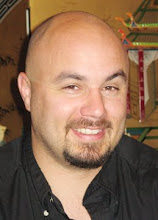

Leif never met my father, who died by taking cyanide at the age of 46 when I was only 12 years old, and yet Dad may have passed on several characteristics and propensities to the grandson he never saw. My father was brilliant, as was Leif. He taught himself chemistry, eventually studying organic chemistry at the University of Wisconsin and earning his PhD. He had tremendous musical ability and had studied the piano, playing complex concert pieces. He had the receding hairline that Leif inherited, and that glowing smile. At the time he died, after a couple of years of severe depression, none of us knew back in those days that a propensity for chronic, clinical depression could be inherited, or that the genes for it could be "switched on" by trauma.
Since he died when I was twelve, fifteen years before Leif was born, and I never saw them together, it didn't dawn on me until last fall how much Leif looked like his grandfather. I didn't realize it until I was visiting my nephew, Rick, and saw a photo of him on the wall that reminded me strongly of both Leif (his first cousin) and my dad. Then I suddenly saw the resemblance that Leif bore to his grandfather.
I wish they could have known each other. Leif craved the company of smart people with whom he could discuss ideas. He would have enjoyed my father, though they would likely have disagreed on some things. It's sad that my father never saw his children grow up (my brother and sisters were younger than I was) and never saw any of his grandchildren or great-grandchildren. Sad that he couldn't find joy in life any more, despite his family of four kids and his "American dream" lifestyle owning his own home, a car, and working as an assistant professor of organic chemistry at Kansas State University. By the time he died, he had patented 28 compounds, though the rights to use them were owned by Dow Chemical Company because they had given him grants to do the research.
Dad used to say, way back in the 1950s, that one day we would discover that mental illness is caused by chemical imbalances in the brain. We are finding that out these days. His prediction is coming true, but that didn't save his grandson. Leif didn't ask for help, didn't try medication, as far as we know.
People have often asked me why am interested in genealogy, family history, saying they aren't interested in birth and death dates and a bunch of dead people, but what they don't understand is that family history is the stories, who these people were, the lives they led . . . and how that impacts or influences us. I am more and more sure that they do, in more ways that we can ever know. After all, we are made from their genes. What have they passed on to us?
I have noticed in looking at generations of photos that often there will be startling resemblances between people who are separated by two or three generations, like Leif and my father, but I never dreamed that one of my son's would commit suicide as he did.
Leif grew up knowing about my father's death, knowing how it had affected me. That was one reason that he didn't kill himself at Fort Drum, New York when he was so devastated, because he knew it would hurt me. I told him always to remember that, and that if he ever felt that way again, to remember it and do whatever it took to stay alive. That was not to be. I don't know, and never will know, what tipped the balance and made him decide to put his new pistol to his head and pull the trigger on April 9, 2008. Even though I know of all the problems and disappointments, heartaches, he'd had, what was it that made death seem like the only way out? Was the depression and the decision to die programmed into his genes, passed down from his grandfather, and set in motion by all the trauma he experienced?
------------------------
The top photo is of my father on his wedding day, June 13, 1943 when he was 30 years old, just three years younger than Leif was when he died. The second one, one of the very rare color photos of him, was taken in 1959 when he was 46 years old, less than a year before he died.





No comments:
Post a Comment